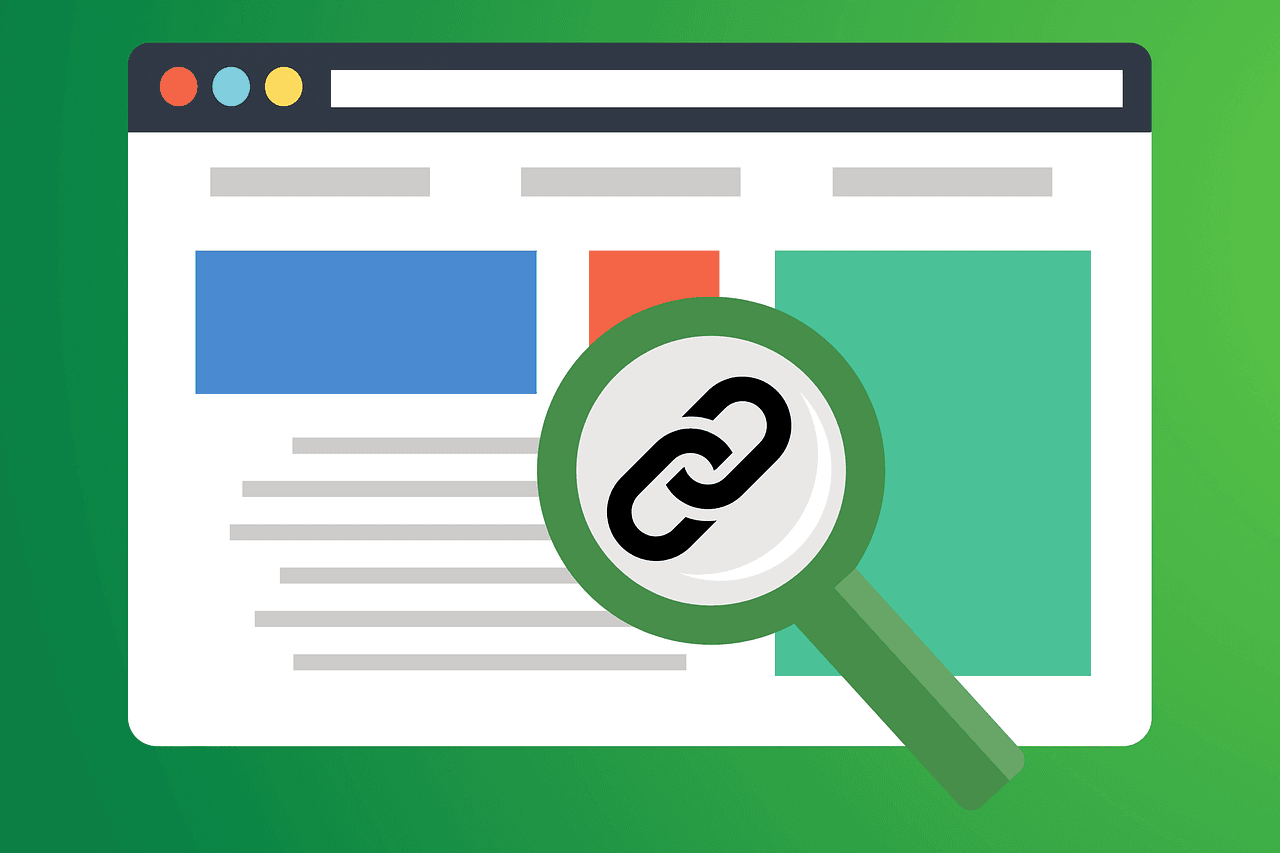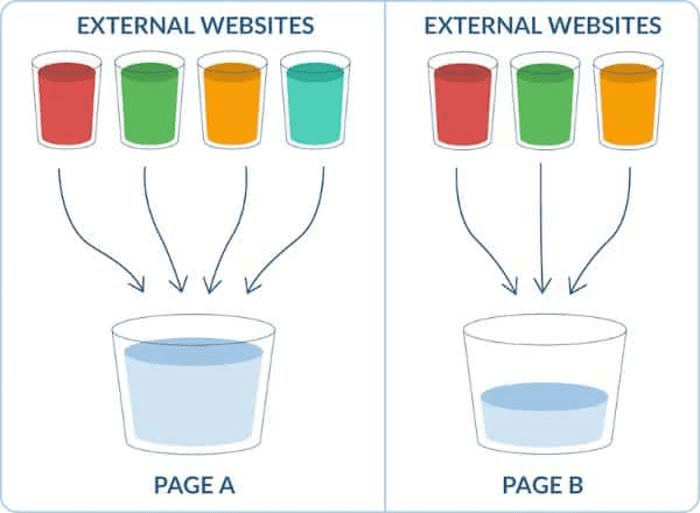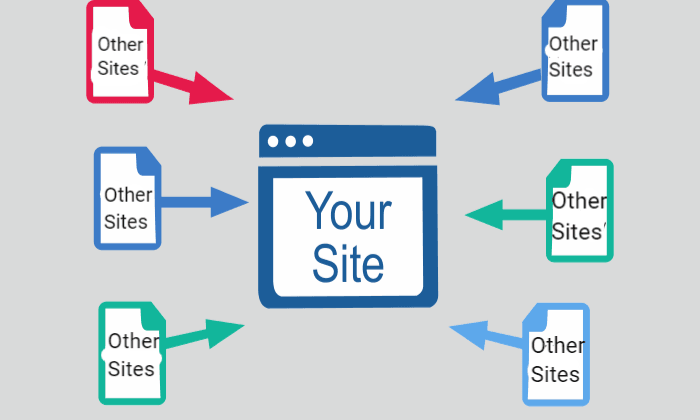Quick Summary
This article reviews seven of the best keyword research tools, highlighting their features, pricing, and pros and cons. Tools like Keyword Metrics, SEMRush, and Google Keyword Planner offer unique capabilities that streamline keyword analysis, uncover opportunities, and enhance SEO strategies. By using these tools, businesses can optimize content, target the right keywords, and boost search engine rankings effectively.
Looking for the Best Keyword Research Tool?
Keyword research is crucial to any business's SEO strategy. Many companies struggle to identify keywords that resonate with their target audience, attract traffic, and improve search rankings. Deciphering what users are searching for requires significant time and effort.
This is where keyword research tools come in handy. In this Keyword Metrics article, we’ll explore the 7 best keyword research tools available to enhance your strategy.
What Is a Keyword Research Tool?
A keyword research tool helps businesses identify the best search terms to target, offering insights into search volume, competition, and related keywords. These tools allow businesses to ensure their content is optimized, and ultimately attract more visitors.
7 Best Keyword Research Tools
Keyword Metrics
SEO.com
SEMRush
Moz
Keywords Everywhere
Google Keyword Planner
Jaaxy
1. Keyword Metrics
Keyword Metrics is a powerful SEO tool that takes the guesswork out of keyword analysis, transforming a time-consuming process into a simple, efficient one. With its ability to scan all your website pages, our tool identifies valuable keywords you’re already ranking for, allowing you to optimize and improve your rankings. Keyword Metrics automates keyword research ensuring you focus on boosting content and climbing search engine results with minimal manual effort.
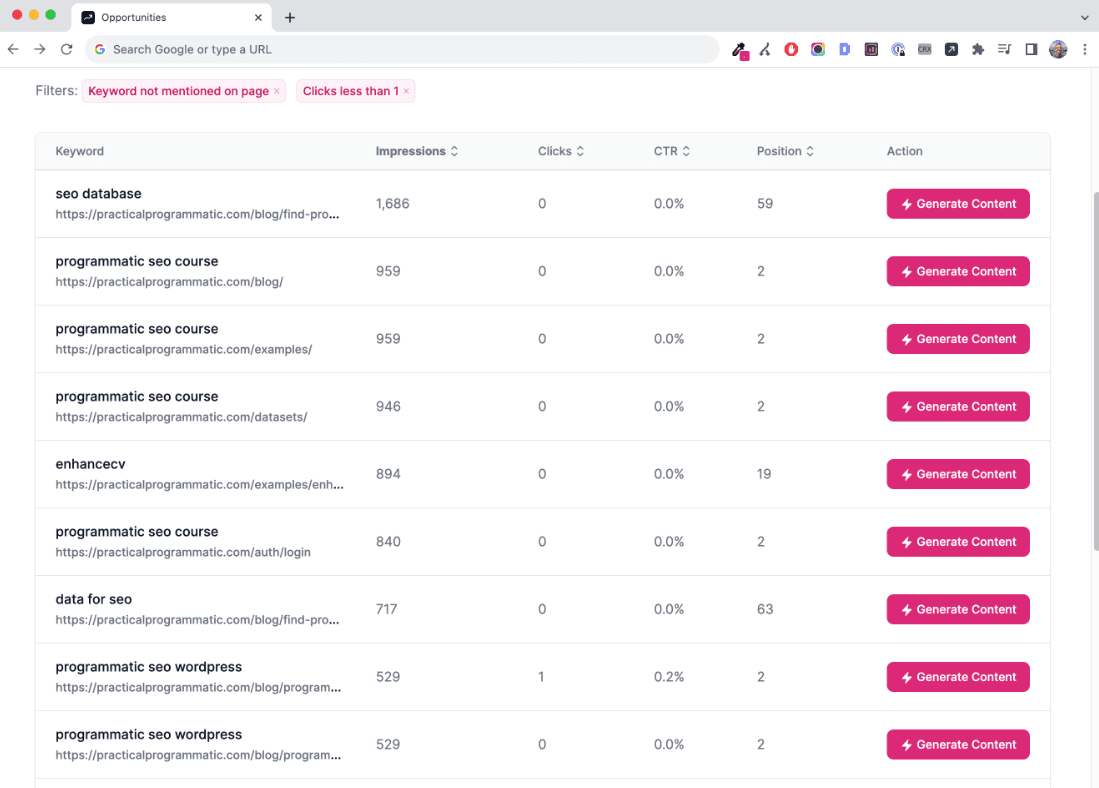
Key Features
Quickly analyzes your website content to uncover SEO opportunities.
Detects keywords you're ranking for but haven’t fully optimized.
Provides SEO-optimized content suggestions to enhance your pages.
Keeps you updated on performance with regular email summaries.
Easily narrow down the most valuable keyword opportunities.
Enables exporting data for more in-depth analysis.
Pros
Save hours each week on content auditing with its automation tools.
Focus on high-potential keywords to improve rankings from page 2 to page 1.
Enhance your site by answering user questions and providing more valuable content.
Automate most of your SEO efforts, significantly reducing manual workload.
Cons
No free trial available
Pricing
Keyword Metrics offers three pricing tiers: the Solo plan starts at $10, Pro costs $20, and the Agency plan is $50, each with additional features tailored to user needs.
2. SEO.com
SEO.com offers free keyword research and various other SEO tools to help fire up your SEO strategy. It provides features such as traffic analysis, site audits, competitor insights, and keyword tracking to give your website a competitive advantage. With tailored recommendations, it allows you to boost your rankings faster than your competitors.
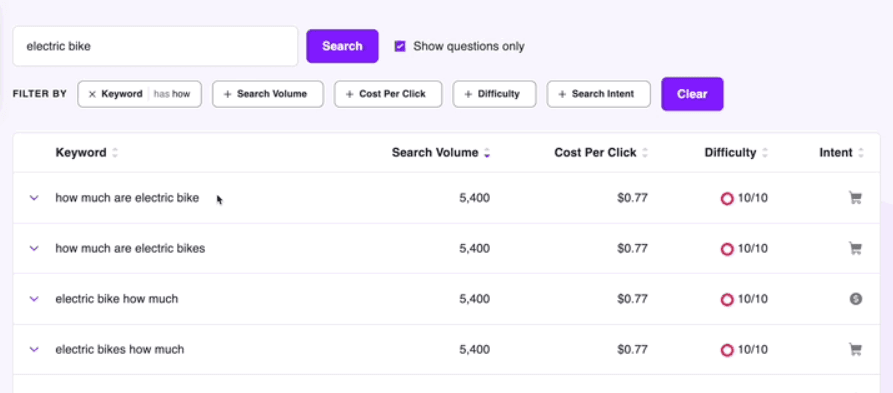
Key Features
Access essential SEO resources without straining your marketing budget.
Monitor site traffic, keyword rankings, and other key performance indicators.
Offers a zero-cost plan for users with basic needs.
Pros
Efficient tools reduce the time spent on SEO tasks.
Provides valuable competitor insights and actionable ranking recommendations.
Cons
Does not offer a dedicated keyword research tool separate from its full-service SEO package.
Relies on the agency for updates which may lead to slower implementation compared to a self-managed.
Pricing
SEO.com offers a free SEO Starter plan, with premium features accessible through a $24 monthly subscription.
3. SEMRush
SEMRush is a powerful SEO tool known for its comprehensive suite of keyword research features. It offers in-depth analysis through tools like Keyword Overview and the Keyword Magic Tool, helping users discover search volume, keyword difficulty, CPC, and related questions. One of its standout features is the ability to generate thousands of keyword suggestions in seconds.
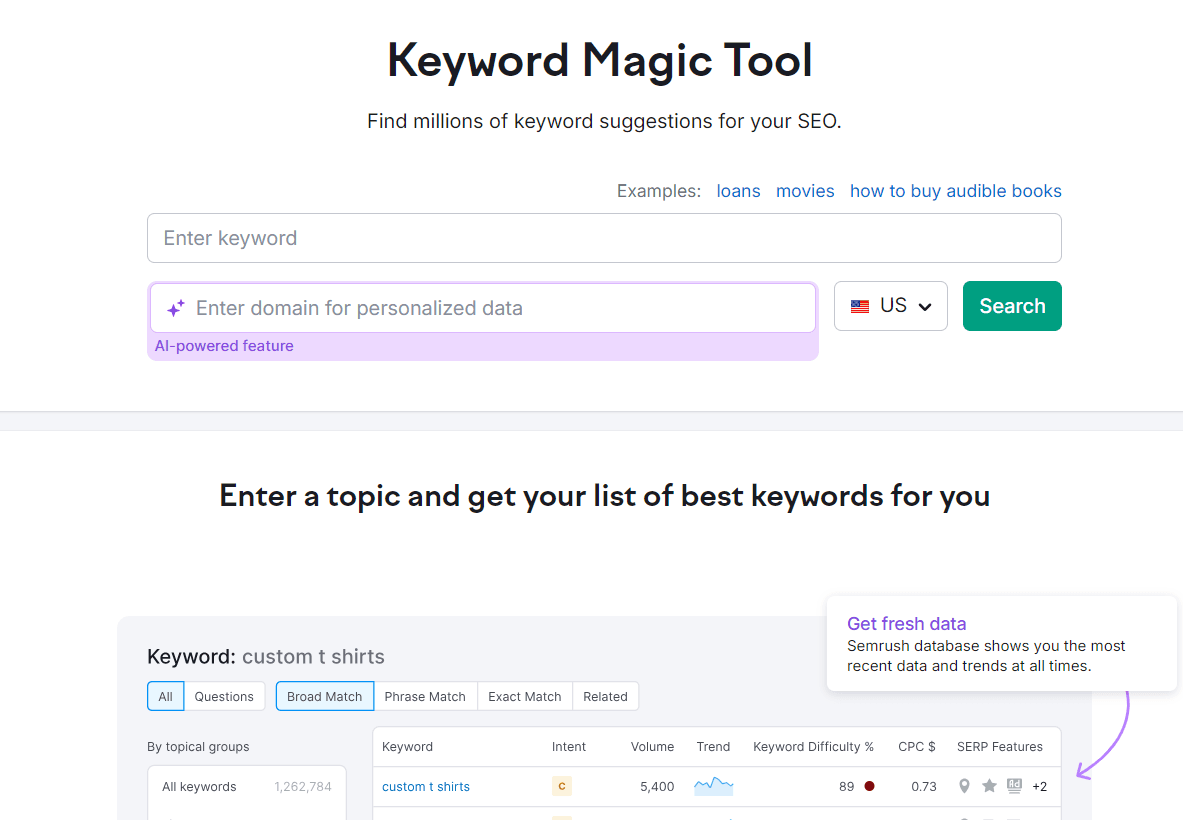
Key Features
Provides a massive database of related keywords, including long-tail options, with filtering and difficulty analysis.
Offers keyword clustering and a 12-month trend graph for comprehensive insights.
Compares keyword performance across up to five competitor websites.
Suggests additional content ideas based on target keywords.
Pros
Massive keyword database with over 20 billion entries.
Wide range of keyword tools including Keyword Magic.
Intuitive interface, accessible for both beginners and pros.
Cons
Limited website crawling capabilities compared to other tools.
Only provides keyword research data for Google searches.
Lacks phone support, with only live chat or email options available during business hours.
Pricing
SEMRush offers a variety of pricing plans, starting with a free version and a Pro plan at $139.95 per month, with additional higher-tier options available.
4. Moz
Moz's SEO platform provides a range of keyword research tools, including the Keyword Explorer, which allows users to analyze any keyword's monthly search volume, difficulty, and organic clickthrough rate (CTR). It also provides insights into search rankings and related keyword suggestions. With features like straightforward difficulty metrics and minimum domain authority, Moz makes it easy to focus on keywords you have a strong chance of ranking for, while the Keyword Gap feature helps identify missed opportunities from competitor rankings.
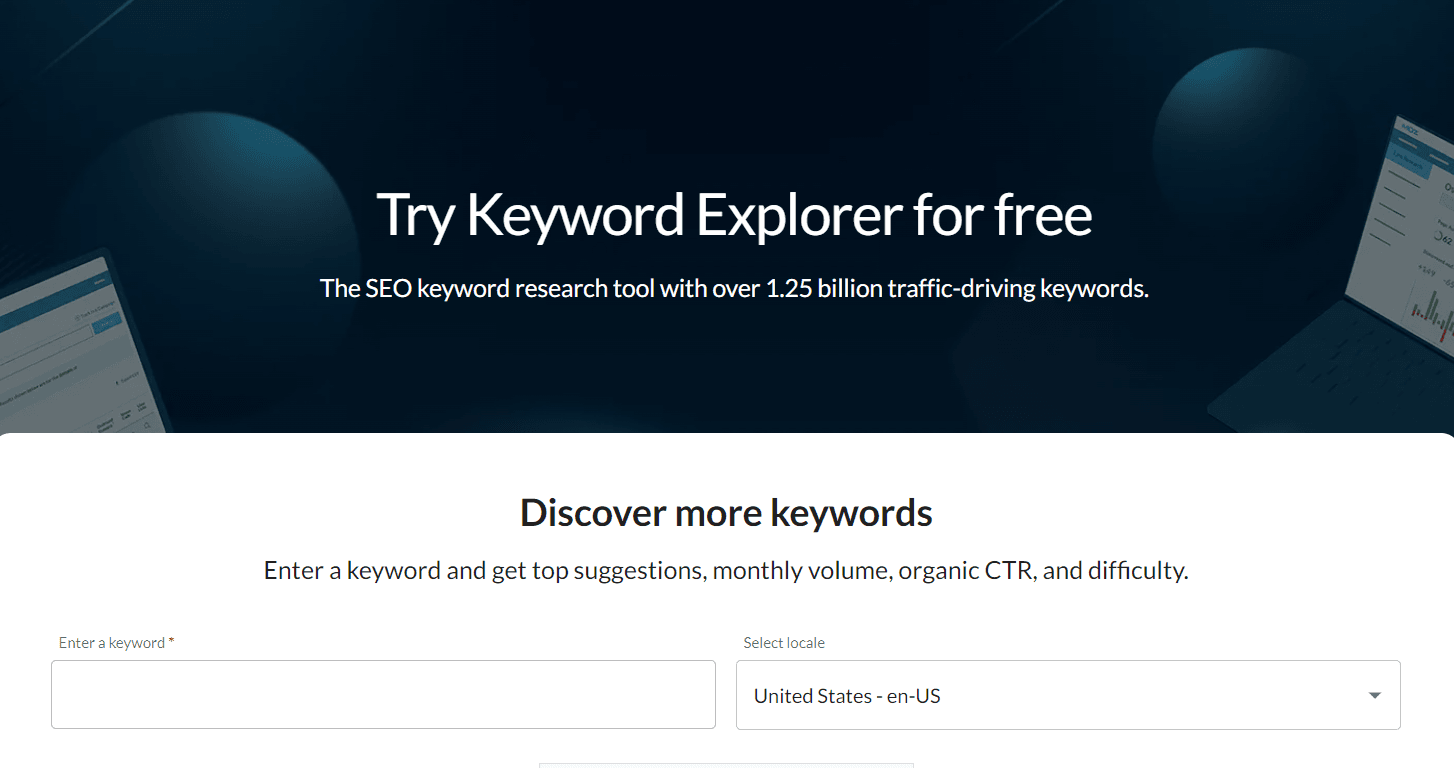
Key Features
A rich database of over 500 million keyword recommendations.
Provides insights like search volume, keyword difficulty, and organic CTR.
Displays search intent and first-page SERP features.
Combines multiple metrics to determine the most valuable keywords to target.
Aligns keywords with different stages of the buyer's journey and intent.
Pros
- Easier-to-understand data presentation compared to many other platforms.
Clear and simple prioritization metrics.
Wide range of tools accessible at no cost.
Cons
Provides less data compared to more comprehensive tools.
Pricing
Moz's premium pricing begins with the Starter plan at $49 per month and provides tracking for up to 50 keywords.
5. Keywords Everywhere
Keywords Everywhere is a browser-based SEO tool that shows keyword data like search volume and CPC as users browse search engine result pages and other websites.
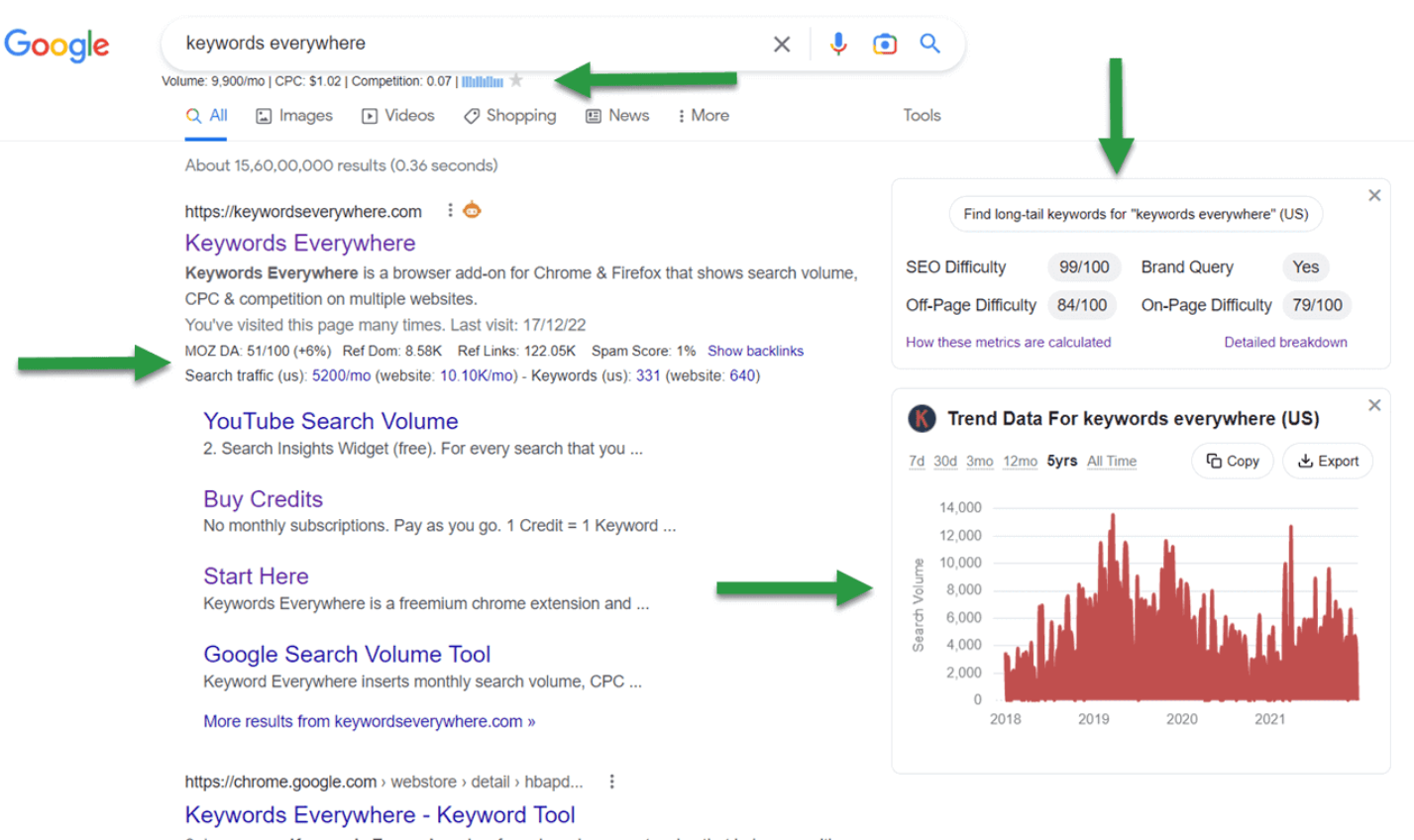
Key Features
Provides insights into keyword performance, backlinks, and ranking data.
Estimates monthly traffic and identifies keywords a page ranks for.
Displays the most-used words and phrases on a webpage.
Upload keywords in bulk to retrieve volume metrics.
Allows saving and bulk exporting of keywords.
Pros
Shows keyword insights on multiple platforms like YouTube and Google Search Console.
Integrates keyword data directly into search results.
Offers support for 15+ websites, packed with features and metrics.
Cons
Data accuracy is lower compared to more comprehensive SEO tools.
Lacks the advanced features of full-fledged SEO tools like Semrush.
Requires their API before you can start using the extension.
Pricing
Keywords Everywhere operates on a freemium model, charging users based on credits. A minimum of 100,000 credits costs $10, with one credit equal to one keyword.
6. Google Keyword Planner
Google Keyword Planner is a top-tier tool for pay-per-click keyword research, offering robust features at no cost, even if you don’t use Google Ads. It provides two core tools: one for finding new keyword ideas and another for search volume and forecasting analysis.
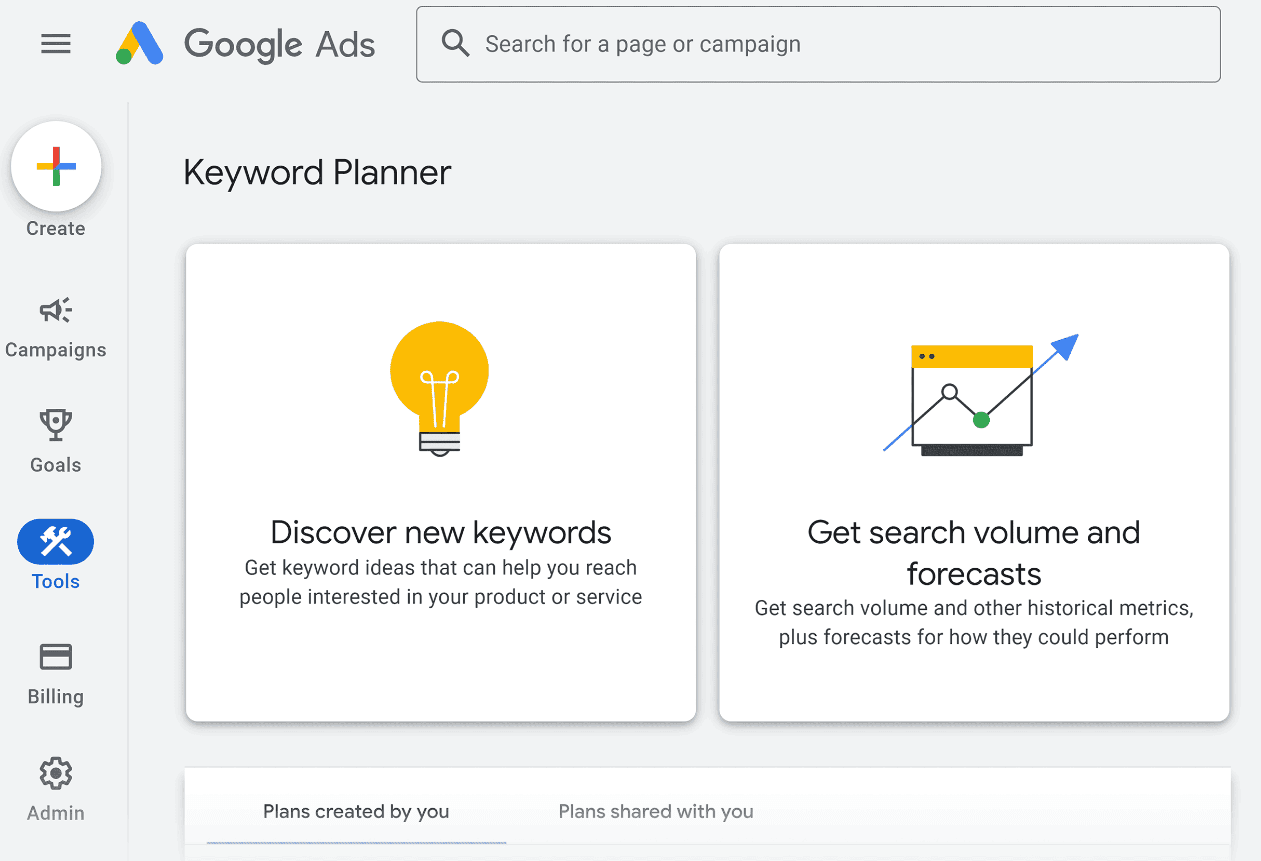
Key Features
Input a keyword to generate a list of related search terms with their average monthly searches.
Access detailed data on keyword trends and volume over time.
Track how your site performs for keywords and compare against competitors.
Gauge keyword competitiveness by estimating cost-per-click values.
Store and manage keywords within your projects or search history.
Narrow down your keyword list using filters and sorting options.
Pros
Completely free to use, even without Google Ads.
Forecasting tools are valuable for planning ad-budgets.
Can generate keyword suggestions based on your website content.
Cons
Less useful for organic keyword research.
Pricing
Google Keyword Planner is entirely free to use as long as you have a Google account.
7. Jaaxy
Jaaxy is a fast and efficient keyword research tool that delivers hundreds of keyword suggestions in seconds. It's user-friendly, providing key SEO insights like traffic and keyword difficulty, with additional features like competition analysis and niche research.
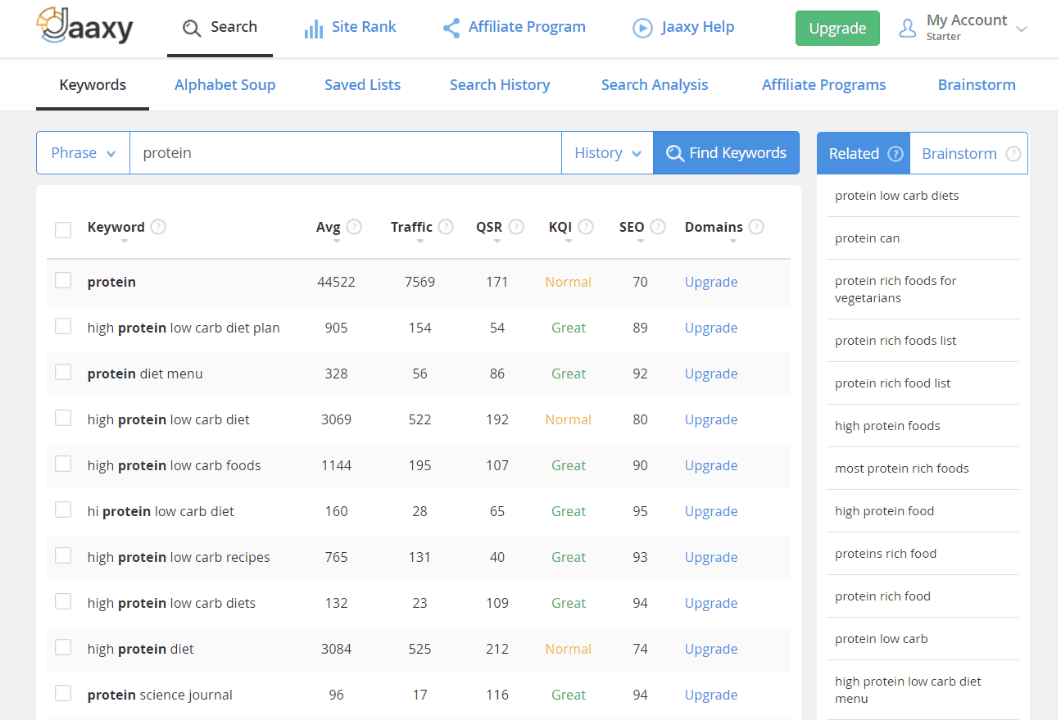
Key Features
Quickly generates related and suggested keywords.
Provides essential statistics for each keyword.
Gives insights into keyword competition.
Offers data on potential niche markets.
Tracks how well keywords rank organically.
Pros
Extremely easy to use, offering quick keyword lists with basic data.
Ideal for driving traffic and supporting online marketing efforts.
Beginner-friendly, especially for those exploring new niches.
Supports Yahoo and Bing search engines.
Cons
Lacks advanced filtering options for refining keyword lists.
Not as feature-rich or powerful as other comprehensive SEO tools.
Pricing
Jaaxy is perfect for affiliate marketers. It offers a free version with 30 keyword searches. Paid plans start at $49 per month.
Move Up SERP Rankings with Keyword Metrics
Using keyword research tools is essential for improving your SEO strategy.
It's not enough to merely put up content with all sorts of keywords that may or may not be relevant to your industry. You have to dive deeper into the search terms you’re targeting and identify keyword opportunities that can push your brand high up SERP rankings and increase your website traffic.
Start using Keyword Metrics to turn your keyword data into actionable SEO strategies that drive results.
Check out our previous article on how to use Google Search Console filters practically.
